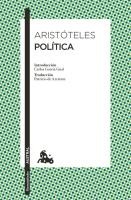Política reúne los escritos que Aristóteles (384-322 a. C.) dedicó a la vida en sociedad y la organización de la convivencia cívica.
Una suma de tratados menores de sorprendente riqueza de temas, expuestos con la agudeza y profundidad que caracteriza el pensamiento aristotélico. El discípulo de platón comienza analizando las estructuras básicas de la sociedad, en la que la ciudad representa el logro más cabal: el hombre está definido como un ser cívico, un politikón, y por encima de la familia, la tribu y la aldea se perfila la polis como el ámbito autosuficiente de la cultura y la vida feliz. Tras pasar revista a los distintos tipos de gobierno, se muestra partidario de la democracia moderada, la clase media, el equilibrio de poderes y una constitución mixta. Señala después los rasgos que definen al ciudadano en su participación en la tareas comunitarias, e insiste en la importancia de la educación para mantener y mejorar esa vida digna y libre. De temperamento moderado y liberal, Aristóteles defiende los logros civilizadores de la polis helénica, su limitado humanismo y su marco seguro y acogedor, frente a los riesgos de la revolución y la confusión.
Con sobrados méritos, este es uno de los libros clásicos del pensamiento político, no tanto por sus soluciones cuanto por la honestidad y claridad de sus planteamientos.

